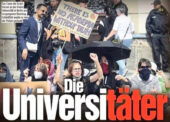The DESY research centre in Zeuthen is working on an Israeli observation satellite with an unprecedented wide angle. Employees criticise the one-sided positioning in the Gaza war.
In three years’ time, a flying telescope could revolutionise space observation: A rocket from the SpaceX company is to carry a satellite with an unprecedentedly huge visual field into space. The wide angle of this Ultrasat is 200 times larger than the most sensitive predecessors to date. The technology offers a “vast space for serendipitous discovery”, according to the Israeli Weizmann Institute of Science, which is responsible for managing and financing the space mission together with Israel’s space agency.
With two arms companies, the most important industrial partners also come from Israel: The spacecraft is being built by Israel Aerospace Industries (IAI), the telescope with electro-optical sensors by its competitor Elbit. Another important participant is the Brandenburg branch of the German Electron Accelerator (DESY) in Zeuthen, which belongs to the Helmholtz Association. The researchers employed there are developing the high-resolution UV camera for the super telescope. In addition to groundbreaking new findings, the Ultrasat mission is also intended to “strengthen the world standing of the Israeli space industry as well as the international standing of Israel”, the Weizmann Institute explains.
However, there has been a dispute among the researchers involved in Ultrasat for months due to DESY’s one-sided position on the Middle East conflict. As an immediate reaction to the murders committed by Hamas and Palestinian Jihad on 7 October, the directorate published a statement on their website. “DESY has diverse connections with Israeli scientists and partner institutions in Israel. We mourn with our Israeli friends and colleagues for the victims and share their concerns. We stand firmly by their side”,, it said. Four weeks later, an Israeli flag was hung up at the DESY sites in Hamburg and Zeuthen.
The two sites together employ around 3000 people from all over the world. Among them are people from Arab countries and also from Palestine. Around 40 employees work in Zeuthen at Ultrasat. On 23 February, 160 members of DESY criticised the statement on the Internet and the fact that all employees had to look up to the Israeli flag during the Gaza offensive in an open letter to the management.
They are following the events in Israel and Palestine “with great concern” and “find it right” to condemn of the acts of 7 October, it says. It continues: “In this context, we feel it is a slap in the face that the now almost 30,000 victims on the Palestinian side, almost half of whom are children, continue to be completely ignored by DESY”. The signatories are calling for the Israeli flags to be replaced by a peace flag or for Palestinian flags to be hoisted.
However, such pro-palestinian flag statements were unwelcome: At the beginning of December, an employee had equipped his bicycle with a Palestinian flag and parked it near the entrance in Zeuthen. The management had it removed after three days.
How does this fit in with the personal “freedom of expression” that all employees are entitled to, according to a statement by DESY Director Christian Stegmann from Zeuthen? “The anonymous display of a flag at the entrance area in the public space of the institute is not part of this,” Stegmann explains to “nd”, and continues: “Other signs of solidarity with victims in Gaza by employees are still on the institute premises.”
The bicycle that was removed, contrary to this claim, belonged to technician Martin Renzmann. This was anonymous, and he known to many colleagues as the owner, Renzmann told “nd”.

The Israeli flag remained at the entrance until 8 March. Stegmann explains that they then “realised that the symbolism of the Israeli flag could be received differently than intended” and took it down. The Management Board had announced to the staff that it wanted to put up a “sign against anti-Semitism” instead, but this has not yet happened.
It cannot be said that the Board of Directors refused to discuss the internal conflict, as evidenced by dozens of messages from various chats available to “nd”. Stegmann finally invited everyone to two talks in the canteen in January and February in order to listen to each other openly and allow questions. However, taking down the Israeli flag was never on the agenda, Stegmann emphasised in an internal DESY chat.
For the second discussion, the Directorate invited the Amadeu Antonio Foundation to moderate. This foundation is named after the Angolan Amadeu Antonio, who was murdered by neo-Nazis in Eberswalde in 1990. In the Middle East conflict, the foundation positions itself on the side of Israel, describes the accusation of genocide in Gaza as a lie and has developed its own, very strict definition of anti-Semitism, which makes it difficult to criticise the state of Israel.
“Anyone who is familiar with her knows that the methods and orientation of the Amadeu Antonio Foundation on this issue were not suitable for creating a protected, neutral framework for people of Arab origin,” says the technician Renzmann. However, Director Stegmann says that the moderator did not make any substantive contribution of his own and sees no problem with the invitation. Others see the invitation as further evidence of one-sidedness.
“The Directorate must finally abandon its double standards and express sympathy for all our affected colleagues in the statements on our website,” explains scientist Rolf Bühler. If the Board of Directors makes political statements on behalf of the entire institute, he would like the staff to have a democratic say.
The researchers involved want to use the Ultrasat to study supernovae, changing stars, gravitational waves and other galactic phenomena and help explain the origins of the universe. But the companies involved, Elbit and IAI, also manufacture state-of-the-art weapon systems. These are also used by the Israeli military in Gaza. Elbit has sent several employees to the campus in Zeuthen.
Some DESY employees therefore fear that their technical developments could be used for military purposes in Israel. Bühler also believes it is possible to utilise the wide-angle technology from Ultrasat in reconnaissance satellites.
This is not far-fetched: Elbit and IAI already launched a similar satellite into space two years ago with the Eros C-3. Unlike Ultrasat, this telescope looks at the earth. “Imagine standing atop Mount Hermon, Israel’s northernmost point, and witnessing the individuals in the southern city of Eilat, over 450 kilometers away”, says the manufacturer, praising the “incredible feats of vision” of the built-in sensors.

If everything goes well at launch, the Ultrasat will remain in geostationary orbit for three years, and the fuel it carries would even last for six years. All data is transmitted in real time to ground stations and forwarded to the research community involved.
The expected expenditure for the Ultrasat project is around €92 million. This is extremely favourable for a satellite with such capabilities. Israeli arms companies could also benefit from the low manufacturing costs for the jointly developed space technology in the future.
Published in German in „nd“.
Image: Israeli flag at the entrance to the DESY Institute in Zeuthen. Many employees are missing empathy for the victims of the Gaza war (Rolf Bühler).





Leave a Reply